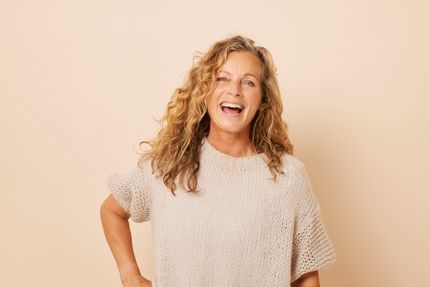

Life after you've stopped having periods: what to expect in postmenopause
Whether you've just hit menopause or have been postmenopausal for some time, you can continue being as strong and energetic as you've always been during this new phase of your life. With proper self-care, it's possible to feel good in your body for years to come. Postmenopause can be a time of liberation and opportunity. Many women feel more confident, know better what they want, and care less about what others think of them.
Postmenopause is an exciting time. What do you need to know about postmenopause? Do you know how to stay healthy after menopause? We're happy to explain below.
What is postmenopause?
Menopause is the time when you stop having menstrual periods. It is diagnosed in hindsight: once you've stopped menstruating for 12 consecutive months, you've passed through menopause and are in postmenopause. It's a natural process that is part of the journey of life.
Postmenopause starts at different ages for different women. Some women stop having periods in their 40s and others continue well into their 50s. However, the average age is 51.
Your hormones during postmenopause
Once you've stopped menstruating, you are no longer fertile. Your ovaries have stopped producing oestrogen and progesterone. From now on, they only produce testosterone. As you can no longer get pregnant naturally, your body does not need high levels of sex hormones.
This doesn't mean your body stops producing oestrogen and progesterone altogether. In postmenopause, the adrenal glands (two glands on the top of your kidneys) take over hormone production. So, your adrenal grands need even more care during this stage. We’ll get back to this later. Your body is still producing sex hormones, only at much lower levels.
What are the symptoms of postmenopause?
The cessation of the production of reproductive hormones (oestrogen and progesterone) in the ovaries is a natural process. During postmenopause, your body needs to adjust to lower hormone levels and rebalances itself. Low oestrogen in particular can lead to various symptoms. It can also increase your risk of osteoporosis and cardiovascular disease.
Other symptoms of postmenopause include:
- Vaginal dryness
- Labial burning
- Urinary tract infection
- Weight gain
- Poor sleep
- Joint pain
- Skin ageing
- Hair loss
- Hot flashes
- Low mood
These symptoms can be caused by low oestrogen. However, ageing can also be a contributing factor. This can make it difficult to pinpoint the source. Is it postmenopause? Or simply a sign of ageing?
During postmenopause, most menopausal symptoms slowly disappear. Dry mucous membranes (dry eyes, vaginal dryness) is the only problem that tends to linger due to oestrogen loss.
Can low oestrogen cause health problems?
Hormone replacement therapy (HRT) replaces the hormones that your body produces less of as you go through menopause. Some people are convinced that HRT can also help women during postmenopause because it reverses the effects of low oestrogen on the body. This is a myth. You don't need to keep taking hormones for the rest of your life.
Menopause is a normal life change and a natural part of ageing. Yes, oestrogen and progesterone production stabilises at a level lower than before menopause. But in this stage of life, the female body needs less oestrogen and progesterone. When the ovaries stop producing these hormones, production is taken over to a small extent by the adrenal glands and belly fat cells). Often, this conversion of oestrogen is enough to sustain you in postmenopause, provided you keep looking after your health and well-being.
How do you look after yourself during postmenopause?
The change in your body’s hormones is a sign to keep looking after your health and well-being, and to listen to your body. There can be an increased risk of some health conditions in postmenopause. It is important to have a healthy diet and lifestyle to reduce this risk.
What you want to do is lean into the change your body is going through. Regular exercise, a healthy diet, supplemented with certain vitamins and minerals as well as rest and relaxation, are crucial things you can do for your body. Here are some basic tips to keep in mind to stay healthy.
- Eat a healthy, balanced diet. Pack your diet with fruit and vegetables. Opt for foods that are rich in protein, healthy fats and slow-acting carbohydrates. Avoid sugar and fast carbohydrates, and cut back on alcohol or stop altogether. Drinking alcohol is also a big risk factor for cardiovascular disease.
- Find ways to relax. Chronic stress can impact hormones. Your adrenal glands release cortisol in response to stress. If your body produces cortisol over a long period of time, this can affect various bodily functions, such as the production of sex hormones. Take breaks more often, do breathing exercises and set priorities. It’s OK to slow down and enjoy life!
- Be physically active every day and do strength training. Any form of exercise, whether it’s walking, cycling, running or yoga, keeps your bones healthy and improves your overall health. Strength training helps strengthen bones and muscles, keeps the body supple, and prevents pain. The seven-minute workout is highly recommended!
- Improve your balance. Pilates and yoga are effective for improving your balance and can help minimise the risk of falling and fractures.
- Keep an eye on your cholesterol and blood pressure. Experts advise to have your blood pressure and cholesterol checked annually. After menopause, blood pressure and cholesterol levels can go up. Regular checks can help identify health problems early.
- Make sure you also do other health checks. Make sure you are aware of other tests (e.g., mammograms, pap smears, gut screenings) or let your GP do an osteoporosis risk check. These checks are used to look for changes, even if you don't have any symptoms. So it's important to get a check-up regularly.
What if I’m on the pill?
Many women use an oral contraceptive to protect themselves against pregnancy. However, in addition to preventing pregnancy, the contraceptive pill also has other effects on the body. Hormonal contraceptives can mask the symptoms of menopause, such as menstrual changes.
Are you on the pill? Then you may not notice period changes or other symptoms of menopause. Perimenopause may have started without you even knowing it. This isn't necessarily a bad thing, but it's something you need to be aware of. Whether you stay on the pill while transitioning through perimenopause depends on your personal situation and needs.
👉 Dr. Jael Loefstop explains: What you need to know about the contraceptive pill and menopause.
During postmenopause, it can be advisable to start or continue with hormone therapy. For example, if you have a family history of osteoporosis or severe menopausal symptoms. Note: hormone therapy has to be started before the age of 60 or within 10 years of menopause for the benefits to outweigh the risks. Also, current guidelines state that hormone therapy should not be used for more than five consecutive years. Read more about hormone therapy.
Sources
Koothirezhi R, Ranganathan S. (2023). Postmenopausal Syndrome. https://www.ncbi.nlm.nih.gov/books/NBK560840/
NHS inform. (2023). After the menopause. https://www.nhsinform.scot/healthy-living/womens-health/later-years-around-50-years-and-over/menopause-and-post-menopause-health/after-the-menopause/
American College of Obstetricians and Gynecologists. (2023). The Menopause Years. https://www.acog.org/womens-health/faqs/the-menopause-years
Tips and advice











